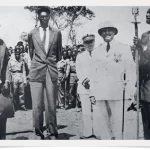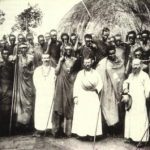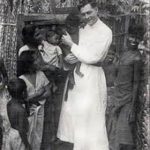Missionary Enterprise and the Mobilization of Hutu Labor
During the height of the 1904 crisis, when rumors proliferated that the Court would attack the missions, the number of Hutu attending classes at Save had dropped by 50 percent, while the people near Zaza were refusing instruction altogether. When the Hutu near Rwaza attacked that mission, the people of the vicinity who had been associating with the Fathers quickly deserted them. As these incidents showed, Hutu were attracted to the missionaries primarily because the foreigners appeared powerful; when they saw the power of the Fathers waver, their loyalty to them did not last.
Like the notables, the Fathers first demonstrated their power in an area by requisitioning goods and services from the Hutu. The demands of the missionaries for labor for their initial temporary installations, burdensome though they were, could be met by the people of the immediate vicinity.When the Fathers began to plan for grander and morepermanent structures, however, they realized that the labor required far exceeded what they could obtain through pressure on local notables or lineage heads. They would have to appeal to the Court, which could mobilize thousands of men through the Court’s ngabo, or regiments, the organizations used traditionally to call upon men for fighting or porterage in war, or for building the residences of the mwami or the batware.
When in July 1905 the Fathers at Save decided to begin constructing the first permanent church in the kingdom, they requested the Court to arrange the transport of several hundred giant trees from a forest three days distant from the mission. The Court reluctantly named several of its notables to supervise the work, giving them authority to call up some of the ngabo of southern Rwanda. For four months approximately ten thousand men were forced to labor for the new church. This “work of the Romans,” as a Father proclaimed it, caused serious problems from the start. Although the porters received a small payment for their work, they complained that the Fathers must be trying to push them to revolt by burdening them so heavily.
The notables, better paid for their services, nonetheless used the opportunities offered by their positions to enrich themselves even further at the expense of the Hutu. They excused from the labor all who would bring them gifts, imposing the remaining burden on those too poor or too stubborn to bribe them. Such a procedure limited the number of workers available and so delayed the entire project. When the Fathers impatiently demanded greater efficiency, the notables began hiding the felled trees deep in the forest where the Fathers could not hope to find them. As difficulties grew, the Fathers themselves interfered with increasing frequency in the transport. Such interference distressed the Court, because it demonstrated even more clearly that the missionaries were the real authority demanding the labor; as one Father noted, the Court was becomingknown as the servant of the foreigners. Since Save was only one of six stations, the Court saw similar demands being made at all the others. Indeed, the Fathers at Zaza at one point planned to ask the Court to provide one hundred thousand men for its construction projects, but they later dropped the plan. The immediate effect of the Fathers’ oppressive requisitions was “disastrous” for the mission, as one missionary commented, but in time these demands—showing the power of the missions to command men—resulted in just that increased respect for the Fathers which the Court most feared.
https://uk.amateka.net/missionary-enterprise-and-the-mobilization-of-hutu-labor/https://uk.amateka.net/wp-content/uploads/2020/04/church55.pnghttps://uk.amateka.net/wp-content/uploads/2020/04/church55-150x150.pngMissionary historyDuring the height of the 1904 crisis, when rumors proliferated that the Court would attack the missions, the number of Hutu attending classes at Save had dropped by 50 percent, while the people near Zaza were refusing instruction altogether. When the Hutu near Rwaza attacked that mission, the people...BarataBarata rpierre@ikaze.netAdministratorAMATEKA | HISTORY OF RWANDA



